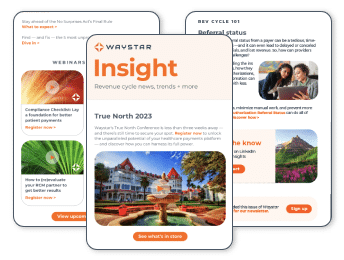Your introduction to the basics of the healthcare revenue cycle. This week: charity care screening.
What is charity care screening?
Charity care screening is an automated process that identifies patients who qualify for charity under a provider’s financial assistance policy. The policy outlines guidelines for free or discounted healthcare services for people unable to cover medical debt who meet certain eligibility requirements.
It’s a vital tool for providers because it enables them to properly assess a patient account prior to bad debt, improving their financial assistance footprint while delivering fair, consistent patient evaluations.
How charity care affects the healthcare industry
A recent survey found 2 in 3consumers are afraid they won’t be able to afford their medical expenses this year. Another survey found 13.2% of the patient population were unsure they had coverage at all. Meanwhile, uncompensated care costs (the sum of a hospital’s bad debt and the financial assistance it provides) have added up to $660B in uncompensated care over the last 20 years.
There’s a sizable portion of the patient population who are both eligible for some form of charity care and unaware of it — and they’re avoiding going to see a doctor because of it. In fact, a recent study found that nearly 1 in 4 Americans are passing on trips to the doctor due to concerns about how much it will cost them.
That’s where charity screening can help most. Providers use a series of tools and procedures to assess incoming patients’ backgrounds and determine whether they are eligible to receive fiscal support, an amount which will vary depending on a hospital’s location, policies, and non-profit status, among other factors.
How charity screening works
For providers to determine whether a patient is eligible, they must assess a complex web of information. Many factors are at play, including income, family size, and age. These factors dictate what level of financial support a person is eligible for and can vary depending on the state.
Charity screening tools use a variety of available information to make that eligibility assessment, with some even running credit checks as part of the process. However, providers in general seem to be moving away from using such data, as checks like that tend to upset patients and strain relationships with them.
Instead, providers are increasingly looking to AI and automation to give staff access to a wider, more versatile data set that can provide quicker, more accurate financial assistance assessments. Keep in mind this generally pertains to already available public records and could include pay stubs, W-2s, tax returns, social security details, or general social service documentation.
How charity screening helps providers and patients
Even before the pandemic, uncompensated care costs had grown to $41.61B in 2019. That bad debt can put a huge strain on a provider’s rev cycle, but the resources required to address the problem are substantial.
In fact, the cost to have staff manually resolve the issues causing bad debt can cost more financially than what’s already been lost, not to mention the potential for human oversight to completely miss some cases.
An automated charity screening solution effectively takes care of both concerns. With automation, staff proactively and automatically identify patients who qualify for charity according to their financial assistance policy.
Why charity screening is a key tool for providers
The gains in efficiency and accuracy mean providers can find more coverage for more patients while ensuring they’re not on the hook for bad debt. What’s more, these solutions use a fair, consistent evaluation process to ensure legal compliance while improving the patient experience.
And all of those are vital benefits because while charity screening had already taken on increased importance prior to the pandemic, the fallout from COVID-19 has pushed providers to pursue more comprehensive solutions to augment their ability to assess eligibility.
The number who have lost their jobs in the past year has led to a staggering portion of the general population losing health insurance coverage. In the U.S., unemployment rose to 17.9M people by June 2020. Globally, one study has found that roughly 1 in 3 people (just over a billion people) have lost their job or business.
While the unemployment rate has fallen to 5.8% as of May 2021, there’s no denying how many are still struggling to find work. As more and more of these people return to the doctor’s office with quarantine restrictions being lifted, they will need help understanding how they can afford care. Charity care screening is a key tool for providers to help meet that challenge, letting them more easily identify and secure financial help for the patients who need it most.
What to look for in a charity screening solution
Beyond supplementing your existing processes and driving more efficient workflows, the solution you choose should be calibrated to emulate fully documented approvals and provide full population coverage, for example. It’s also important to consider how a potential solution could affect the patient experience, especially when it comes to credit checks. Seek out a solution that avoids using hard and soft credit hits and instead relies on other data sources.
Integration can be tricky and disruptive to day-to-day operations if the vendor you work with is ill-equipped or inexperienced. Be sure to confirm a proven history of seamless integrations backed by strong customer support. You should also ask for any testimonials or case studies that offer examples of the tech’s impact on a provider’s community and debt reduction.
Wrapping it up: why charity care screening matters
Healthcare providers are doing their best to assist underserved populations in their community, where the impact of proper charity screening could have its biggest impact. Charity screening is seeing more use by providers looking to help strengthen those outreach efforts, in conjunction with analytical solutions that can track and understand how and to whom in these communities their support is reaching. Backed by this tech, providers are hard at work bringing vital support to the patients who need it most.
Want to find out how Waystar can help you streamline charity screening with an automated solution that delivers truly fair financial evaluations? Learn more about Waystar’s Charity Screening solution.
Find this post helpful? Read How the right coverage detection solution can increase revenue + ease burden on your staff.


